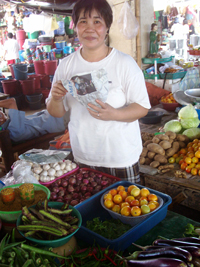Sta. Barbara folks serious about going plastic-free
 STA. BARBARA, ILOILO--Rosario Lucinio discreetly placed the pieces of plastic bag under the table filled with all kinds of vegetables.
STA. BARBARA, ILOILO--Rosario Lucinio discreetly placed the pieces of plastic bag under the table filled with all kinds of vegetables.
"I don't want my customers to see and use them," she explained. She instead placed old newspapers and banana leaves beside the eggplants, onions, tomatoes and potatoes.
"We are minimizing the use of plastic bags," said the 47-year-old Lucinio, who has been selling vegetables at a stall inside the Santa Barbara public market for the past two years.
Lucinio gamely explained why she supports the proposed municipal ordinance regulating the use of plastic bags in the market and other commercial establishments.
"I learned when I was in school that plastics cause pollution. They clog our sewers and rivers and also harm us when we burn them," said Lucinio.
The proposed ordinance is on its third and final reading before the municipal council and is expected to be passed by next month. The town, however, is already on a two-week test run in its implementation.
The ordinance aims to regulate the use or sale of plastic bags as packing or bagging materials and to institutionalize the use of biodegradable containers within the municipality.
It stresses the dangers of the continued proliferation of plastic bags including the clogging up of sewerage systems, death of land and marine animals that mistakenly ingest plastics or become entangled in plastic bags and the contamination of the food chain when polyethylene, the main component of plastic, breaks down and seeps into the soil.
Under the ordinance, vendors and commercial establishments will be required to use prescribed packing/bagging materials such as paper or cloth bags, buri bags, non-plastic sack or bags, sturdy reusable shopping bags or other biodegradable containers. These include even vendors of fresh meat, fish, fruits, vegetables.
The ordinance only allows consumers to use or carry plastic bags re-usable plastic bags which would be marked by market administrators. Shoppers and market customers shall be required to bring the prescribed shopping bags or containers.
The only exemption is in the sale of ice, ice candy, "ice water", retail packing of sugar, salt, coffee and milk.
Glenn Beup, municipal administrator and environment officer, said the ordinance is the town's response to efforts in other countries, cities and towns to reduced plastic bag use.
Among the countries that have launched campaigns or enacted laws are Ireland, South Africa, India and in some states in the United States.
Sta. Barbara, 16 km northwest of Iloilo City and with a population of 60,000, generates 10 sacks of plastic waste daily, according to Beup.
The market also serves residents of Ilolo City and the neighboring towns of Janiuay, Cabatuan, New Lucena, Pavia and San Miguel.
The town has years back implemented waste segregation and recycling but 80 percent of all their recyclable waste are made of plastic.
Beup said the ordinance also aims to boost the market for woven and other native baskets and cut the vendors' expenses on packaging materials. The woven baskets are being sold at P35-P50 each at the main entrance of the market.
Lucinio said she spends P30 per day for plastic bags which she gives for free to her customers. "We can surely save if we just use old newspapers or if our customers bring their own plastic bags."
For the past two weeks, every Tuesday and Friday, the town's designated market day, municipal employees have been monitoring the trial implementation of the ordinance.
Since July, the municipality has been conducting an information campaign on the proposed ordinance using loud speakers in the market and in elementary and high schools.
Radan Ferolin sat a desk at the main entrance with a megaphone urging residents to bring their own containers or plastic bags next time they go to the market. He also explained the reasons for the passing of the ordinance.
Another enforcer stamped and signed the plastic bags brought by the residents so that the bags can be identified when they are used again.
"We have a long way to go but some are slowly bringing their own containers or re-usable plastic bags," said Ferolin.
No penalty is imposed during the dry run but violators will face fines when the ordinance takes effect.
Vendors and commercial establishments caught violating the ordinance will be fined P1,000 for the first offense, P2,000 for the second offense and P2,500 for the third offense and the suspension of business permits for three months.
Habitual offenders face cancellation and non-renewal of their business permits.
Consumers and customers who use non-prescribed plastic bags face a fine of P1,000 for the first offense, P2,000 for the second offense and P2,500 in the third offense.
Offenders who cannot afford to pay the fines are required to render community service of not less than eight hours.
There are some resistance from those who have been used to plastic bags and those who see no point in the ordinance.
"Other customers would still insist but they agreed to bring their old plastic bags or other containers when we ask them to. But some get angry and we have no choice," said Lucinio.
Meat vendor Samuel Soltis, 33, said that while the ordinance has noble intentions, it is impractical for customers of wet goods.
"Some do not bring their own plastic bags so we have to make sure that we have our own because otherwise they won't buy our products," said Soltis.
But for Lucinio, it's only a matter of time before their customers kicked the habit of using plastic bags.
"Some would say that this ordinance is useless because we should close down plastic bag factories first. I think doing that is impossible now. But we can do this gradually in our own small way," said Lucinio.
